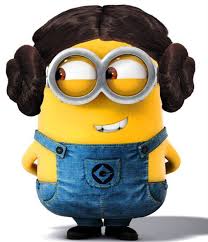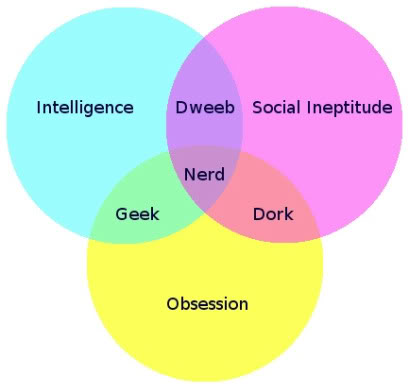Geek and Nerds Traits and Personality to Know which You are

Geeks are dated to the 1500s English word for “dupe, fool, or simpleton.” Before becoming a sociable nerd in this present age, the geeks had a strange life specializing in bizarre and unappetizing behaviors. They were carnival performers, freaks and “wild men” who bit off the heads of live chickens and snakes and possibly swallowed them.
Considering the bizarre acts performed by circus geeks, the word geek eventually came to describe general “oddballs” and “eccentrics.” How geek became smart is debated, but by the ‘50s and ‘60s, a geek was an abnormal, an anomaly, a misfit or “a hated brainiac.”
With the computer and tech revolution, geek boomed in popularity with its friend nerd. Unlike nerd, though, the word geek rooted itself more squarely with technology-related fields once it quit biting off animal heads. Thus, because technology is so important in the Digital Age, so are geeks! What’s more, according to armchair-sociologists, geeks are much more sociable than nerds.
They want to talk about their geeky passions in addition to studying them, and they try to find accessible ways to share their geekiness with others.
For these reasons, we surmise geek has slightly cooler connotations than The words “nerd” and “geek” are often used interchangeably, as if they mean the same thing, but they actually don’t.
In the past, there has been an overlap in the meaning of Geeks, the term has grown a little more than others and has wriggled away from the negative connotations.
WHO ARE GEEKS?

Geek is a digital technology expert or and a person who has excessive enthusiasm for and some expertise about a specialized subject or activity in this 21st Century. Geeks are enthusiasts of a particular field, they are collection oriented, gathering facts and souvenirs related to their subject of interest.
They are always obsessed with the newest and trending things their subject of interest has to offer to the society.
Geek branches out into more social scenes: i.e. “movie geeks,” “music geeks,” “football geeks,” “computer geeks,” and many more.
THE SIMILARITIES AND DIFFERENCES BETWEEN GEEKS AND NERDS

Nerds and geeks pretty much coincide with each other: Nerds possess a high volume of intelligence, obsession, and social ineptness; Geeks alike also possess the same qualities but are Socially Awesome Penguin-enthusiasts.
Nerd: Etymologists think nerd has a combination of influences, in addition to Dr. Seuss and possibly informing his own use. These include a long-running joke of spelling drunk backward “knurd”, implying that studious people don’t drink or party; a 1930s slang term for nuts “nerts”; and a ventriloquist dummy from the ‘30s named Mortimer Snerd.
In the ‘50s, nerds were “square,” but the 1984 movie Revenge of the Nerds started to hint that it was “hip to be square.” Computer culture also helped nerd take flight, but the word wasn’t explicitly associated with technology. Technological prowess was never a requirement to be a nerd; only that the nerd be extremely intelligent in any academic area to which they paid attention while ignoring the trivial social scene. The “Social Ineptness” from earlier is what makes nerd less cool, and thus below geek on the totem pole.
Nerd’s origins are really hazy. The most frequently cited story is that Dr. Seuss coined the word in his 1950 children’s book If I Ran the Zoo. The real doctor of all children’s literary ailments also introduced nerd’s friends, “preep,” “proo,” and “nerkle” in the same book. The problem with the Seuss origin theory is that it’s very unlikely teens who probably weren’t reading Seuss picked up the word and used it so much that it became a national story in only a year. And, why use nerd and not “nerkle”? Nerd had to have been around before Seuss, but the doc certainly made it more popular. Nerds are unattractive, socially awkward, annoying, undesirable and or boring people.
Below are some of the fascinating synonymous lexical legends of Geek and Nerd. They are:
Dork: Now, dorks are people who do silly, ridiculous things. Dorks are quirky, silly and or stupid socially inept people who are out of contemporary trends. They are often confused with nerd and geek but does not mean a dork has the same level of intelligence as a nerd and geek.
Dweeb: This word was derived from apparent social and attitudinal differences between West Coast and East Coast US. And it describes a stereotypical Ivy-league graduate from Harvard, Yale etc. A dweeb is a boring, studious or socially inept person, but it does not connote the same level of intelligence of geeks and nerds even though they are synonymous. An odd author who calls himself Dr. Rufus T. Dingleberry confirms dweeb’s “dimwitted” character, which he claims is a result of the dweeb’s parents’ obsession with certain mind-altering substances.
From the outset then, nerd seems to operate like a geek in that you can preface nerd with just about any subject in which you claim to have some sincere interest and expertise. A caveat though: A quick search of a database on contemporary English shows that the people using nerd are often retaining more of its academic focus: “math nerd,” “language nerd, “meteorologist nerd,” “chemistry nerd,” “bibliophilic nerd,” “statistics nerd.”
Despite being less cool, nerd has definitely achieved a trendier and more complimentary status than dork and dweeb. It’s rare to find a proud “computer dork” or a “word dweeb,” but self-touting “computer nerds,” “book nerds,” and “word nerds,” are appearing left and right.
To outline the general differences between these names, based on how people perceive and use them now, the Venn diagram will illustrate these distinctions. The Venn diagram below was created by an anonymous armchair-sociologist who recognized the pressing need to clarify these confusing terms.

The distinctions between these designations depend on where the terms fall within the interlocking circles. Each circle represents a major feature displayed by some or all of the people who are called or call themselves geeks, nerds, dorks, or dweebs. These notable characteristics are Intelligence, Obsession, and Social Ineptitude.
Nerds tend to be equal parts intelligent, obsessed, and socially inept
Geeks tend to be intelligent and obsessed but importantly not socially inept.